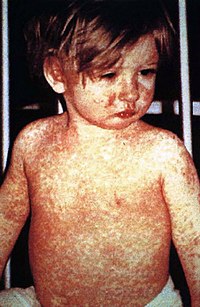
Photo from wikipedia
Population-based studies have revealed 2–10% measles vaccine failure rate even after two vaccine doses. While the mechanisms behind this remain unknown, we hypothesized that host genetic factors are likely to… Click to show full abstract
Population-based studies have revealed 2–10% measles vaccine failure rate even after two vaccine doses. While the mechanisms behind this remain unknown, we hypothesized that host genetic factors are likely to be involved. We performed a genome-wide association study of measles specific neutralizing antibody and IFNγ ELISPOT response in a combined sample of 2872 subjects. We identified two distinct chromosome 1 regions (previously associated with MMR-related febrile seizures), associated with vaccine-induced measles neutralizing antibody titers. The 1q32 region contained 20 significant SNPs in/around the measles virus receptor-encoding CD46 gene, including the intronic rs2724384 (p value = 2.64 × 10−09) and rs2724374 (p value = 3.16 × 10−09) SNPs. The 1q31.1 region contained nine significant SNPs in/around IFI44L, including the intronic rs1333973 (p value = 1.41 × 10−10) and the missense rs273259 (His73Arg, p value = 2.87 × 10−10) SNPs. Analysis of differential exon usage with mRNA-Seq data and RT-PCR suggests the involvement of rs2724374 minor G allele in the CD46 STP region exon B skipping, resulting in shorter CD46 isoforms. Our study reveals common CD46 and IFI44L SNPs associated with measles-specific humoral immunity, and highlights the importance of alternative splicing/virus cellular receptor isoform usage as a mechanism explaining inter-individual variation in immune response after live measles vaccine.
Journal Title: Human Genetics
Year Published: 2017
Link to full text (if available)
Share on Social Media: Sign Up to like & get
recommendations!